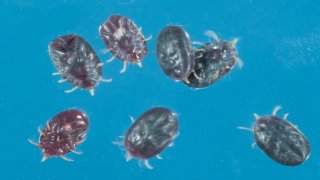
A certain tick species linked to bats was found for the first time in New Jersey -- posing possible health risks to people, pets and livestock, according to a Rutgers-led study.
The study, which appeared in the Journal of Medical Entomology, identifies the tick species, known as Carios kelleyi (or C.kelleyi), as a "soft" tick. According to Rutgers, deer ticks, carriers of Lyme disease, are an example of “hard” ticks.
This soft tick species, a parasite of bats, is known to be in 29 of the 48 contiguous U.S. states. It was confirmed in the Garden State after larvae was collected from big brown bats in Mercer and Sussex counties, in central and northern New Jersey respectively. This species of ticks has been found to have microbes that could be harmful to people and animals such as pets and livestock.
“All ticks feed on blood and may transmit pathogens (disease-causing microbes) during feeding,” said lead author James L. Occi, a doctoral student in the Rutgers Center for Vector Biology at Rutgers University–New Brunswick. “We need to be aware that if you remove bats from your belfry, attic or elsewhere indoors, ticks that fed on those bats may stay behind and come looking for a new source of blood. There are records of C. kelleyi biting humans.”
Meanwhile, senior author Dina M. Fonseca, a professor and director of the Center for Vector Biology said that although the public health risk remains unknown, “finding them on New Jersey bats was an unusual event that prompted bat specialists to contact us. Maybe these ticks are becoming more common."

